
High blood pressure isn’t just a number your doctor checks; it’s closely tied to heart problems and may also affect your emotions and personality.
Researchers have been exploring how feelings like nervousness, sadness, or being easily upset relate to blood pressure, particularly focusing on the lower number in blood pressure readings, known as diastolic blood pressure.
Diastolic blood pressure measures the pressure in your arteries between heartbeats. Recent studies suggest it might significantly influence certain emotional traits.
One such trait is neuroticism, which is a tendency to experience negative emotions like worry, sadness, or frustration more frequently. Scientists have found that diastolic blood pressure levels could impact this trait.
To investigate this, researchers used a method called Mendelian randomization. This technique uses genetic information to understand the relationship between health conditions and traits.
Since our genes affect blood pressure, scientists used genetic data to explore if there’s a direct connection between blood pressure and emotional states, specifically neuroticism.
The researchers analyzed DNA from thousands of people, focusing on tiny genetic variations known to influence blood pressure. Their findings were significant: higher diastolic blood pressure was strongly linked to higher levels of neuroticism.
However, they didn’t find a significant connection between blood pressure and general feelings of anxiety or depression, which was unexpected.
This discovery suggests that the link between heart health and emotional processing is more complex than previously thought.
People with high levels of neuroticism often experience a cycle of stress and negative emotions, which can raise their blood pressure and increase the risk of heart issues.
What’s hopeful about this study is the idea that by managing blood pressure, we might not only protect our hearts but also reduce the intensity of neurotic traits. This could lead to less stress and a more positive outlook on life.
In summary, high blood pressure isn’t just a silent threat to physical health; it might also shape our emotional world. Controlling blood pressure could help improve not just heart health but also mental well-being.
This study highlights how interconnected our physical and emotional health are, emphasizing that caring for our body can also benefit our mind.
The research, led by Cai L and his team, and published in General Psychiatry, opens new doors to understanding and managing the factors that influence both mental and physical health.
This exploration into the heart-mind connection is a reminder of the intricate links between how we feel and how our body functions. As science continues to reveal these connections, it’s clear that maintaining good physical health is also crucial for emotional well-being.
If you care about blood pressure, please read studies about how diets could help lower high blood pressure, and 3 grams of omega-3s a day keep high blood pressure at bay.
For more information about blood pressure, please see recent studies that beetroot juice could help reduce blood pressure, and results showing cinnamon could help lower high blood pressure.
Copyright © 2024 Knowridge Science Report. All rights reserved.



